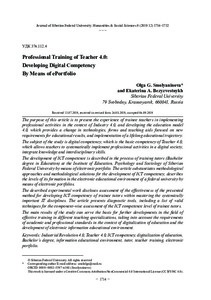Professional Training of Teacher 4.0: Developing Digital Competency By Means of ePortfolio
Скачать файл:
URI (для ссылок/цитирований):
https://elib.sfu-kras.ru/handle/2311/125589Автор:
Smolyaninova, Olga G.
Bezyzvestnykh, Ekaterina A.
Смолянинова, О. Г.
Безызвестных, Е. А.
Дата:
2019-09Журнал:
Журнал Сибирского федерального университета. Гуманитарные науки. Journal of Siberian Federal University. Humanities & Social Sciences;2019 12 (9)Аннотация:
The purpose of this article is to present the experience of trainee teachers in implementing professional activities in the context of Industry 4.0, and developing the education model 4.0, which provides a change in technologies, forms and teaching aids focused on new requirements for educational results, and implementation of a lifelong educational trajectory.
The subject of the study is digital competency, which is the basic competency of Teacher 4.0, which allows teachers to systematically implement professional activities in a digital society, integrate knowledge and interdisciplinary skills.
The development of ICT competence is described in the process of training tutors (Bachelor degree in Education) at the Institute of Education, Psychology and Sociology of Siberian Federal University by means of electronic portfolio. The article substantiates methodological approaches and methodological solutions for the development of ICT competency, describes the levels of its formation in the electronic educational environment of a federal university by means of electronic portfolios.
The described experimental work discloses assessment of the effectiveness of the presented method for developing ICT competency of trainee tutors within mastering the systemically important IT disciplines. The article presents diagnostic tools, including a list of valid techniques for the component-wise assessment of the ICT competence level of trainee tutors.
The main results of the study can serve the basis for further developments in the field of effective training in different teaching specializations, taking into account the requirements of academic and professional standards in the context of digitalization of education and the development of electronic information educational environment Цель данной статьи: представление опыта подготовки будущих педагогов для профессиональной
деятельности в условиях Индустрии 4.0 и развития модели образования
4.0, обеспечивающей изменение технологий, форм и средств обучения, ориентированных
на новые требования к результатам образования, реализацию непрерывной образовательной траектории.
Предметом исследования стала цифровая ИКТ‑компетентность как базовая компетентность
«педагога 4.0», позволяющая педагогам системно реализовывать профессиональную
деятельность в цифровом обществе, интегрировать знания и междисциплинарные
навыки.
Развитие ИКТ‑компетентности описано в образовательном профиле подготовки будущих
педагогов «Тьютор Института педагогики, психологии и социологии Сибирского федерального университета». В статье обоснованы методологические подходы и методические
решения по развитию ИКТ‑компетентности, показаны уровни ее сформированности
в электронной образовательной среде федерального университета с использованием
электронного портфолио. Изложена опытно-экспериментальная
работа по оценке результативности разработанной
методики развития ИКТ‑компетентности будущих педагогов-тьюторов
при освоении системообразующих дисциплин информатического цикла. Представлен диагностический
инструментарий, включающий перечень валидных методик для покомпонентной
оценки уровня сформированности ИКТ‑компетентности выпускников.
Основные результаты исследования могут служить основой дальнейших разработок в области эффективности обучения будущих педагогов различных профилей с учетом требований академических и профессиональных стандартов в условиях цифровизации образования и развития электронной информационно-образовательной
среды
Коллекции:
Метаданные:
Показать полную информациюСвязанные материалы
Показаны похожие ресурсы по названию, автору или тематике.
-
Training Elementary School Teacher in Accordance with Professional Standard for Teachers
Иманова, О. А.; Смолянинова, О. Г.; Достовалова, Е. В.; Аронов, А. М.; Назаренко, Е. М. (2015-11)The work describes a module in “Mathematics, IT and Natural Sciences” for bachelor’s degree program in Education and Pedagogical Science (major fields of study: Psychological and Pedagogical Education). The basic research ... -
РАЗВИТИЕ ИКТ-КОМПЕТЕНТНОСТИ ПЕДАГОГА В УСЛОВИЯХ «УЧИТЕЛЬ-ЦЕНТРИРОВАННОЙ» МОДЕЛИ ПОВЫШЕНИЯ КВАЛИФИКАЦИИ
Фадеева, О. А.; Симонова, А. Л.; Fadeeva, O. A.; Simonova, A. L. (Сибирский федеральный университет, 2016-04-14)В материалах тезиса обсуждается проблемы формирования и развития ИКТ-компетентности у педагогов. Обосновывается необходимость разработки методической системы курса повышения квалификации на основе «Учитель-центрированной» ... -
Efficiency of the Professional Development of a Teacher in the System of Further Training: Analysis of Educational Teachers’ Needs
Petrova, Svetlana O.; Петрова, С. О. (Сибирский федеральный университет. Siberian Federal University, 2021-09)The purpose of the study is to determine the optimal type of training in the course of teachers’ professional development and to identify the expected results of this process. A questionnaire survey of secondary school ... -
Dynamics of Professional Interest of Young Teachers as the Background of Professional Development
Vatashchak, Irina S.; Ватащак, И.С. (Сибирский федеральный университет. Siberian Federal University., 2015-11)The paper describes the results of the All-Russian Research of adaptation, consolidation and professional development of young teachers. It considers the concept of professional interest, its understanding and application ... -
Developing Language Competency of University Teachers to Implement Content and Language Integrated Learning (CLIL) in a Regional University: Challenges and Prospects
Godzhaeva, Natalia S.; Logunov, Timur A.; Годжаева, Н.С.; Логунов, Т.А. (Сибирский федеральный университет. Siberian Federal University., 2015-11)A fundamental flaw in FL training is the fact that it is based either mostly on the principles of General Language, thus leaving graduates unprepared for their occupational-specific language needs, or predominantly ...

